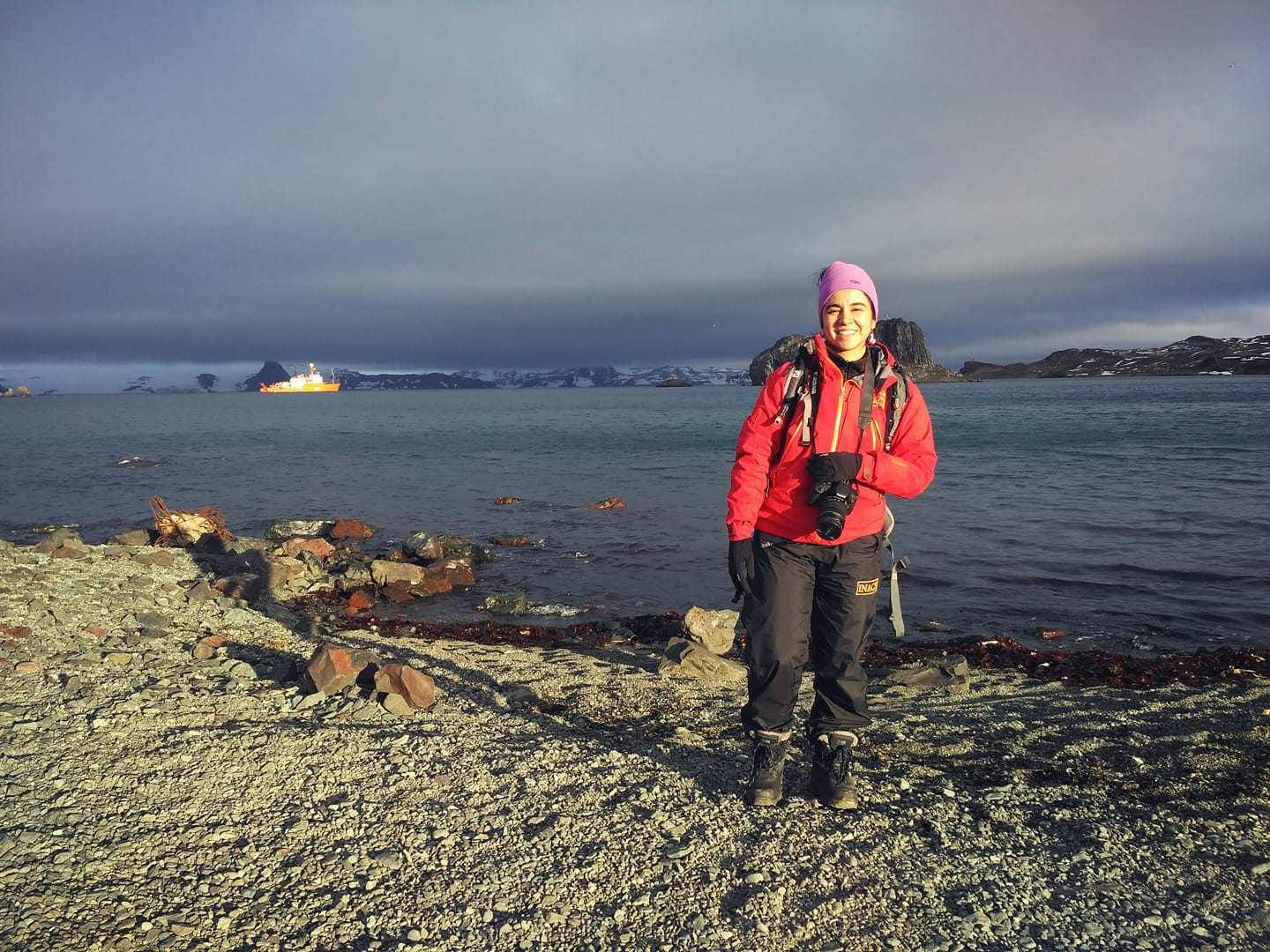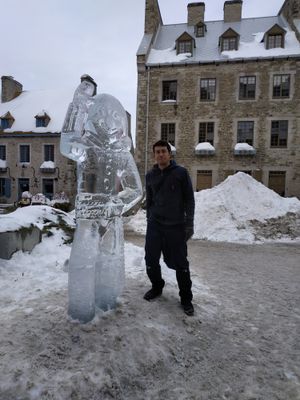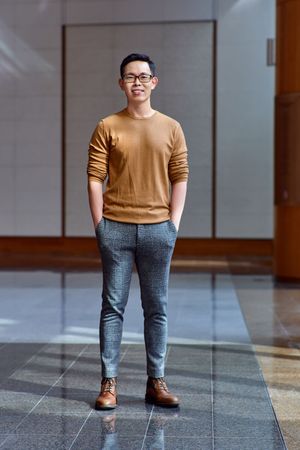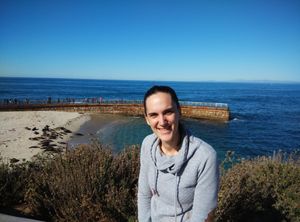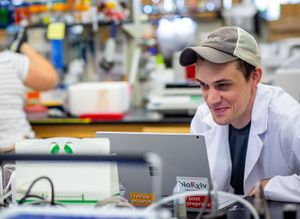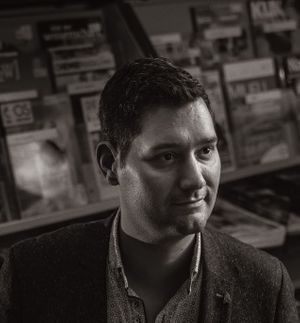This week, we would like to shine a bright spotlight on Carolina Quezada! While we are having a hard time to find enough adjectives to describe what Carolina means to our team, we are going to try our best! Trying to satiate her hunger to improve our research culture, Carolina became a member of eLife's early career advisory group (ECAG) in 2019. She joined ecrLife's editorial team shortly after, and became one of our managing editors last summer. Carolina is incredibly passionate about her research and follows her projects wherever they may take her: Latin America, Europe, Antarctica, there is no place she shies away from! When she is not in the lab, you can find Carolina teaching yoga or Biodanza! Biodanza? You'll have to ask her to explain! :)
The amount of positive energy Carolina brings to the table is incredibly contagious, and helps to create a warm and welcoming environment where everyone feels equally valued. We feel incredibly lucky to have Carolina guide us, and to see how her vision helps shape ecrLife into the amazing platform it has become!
In a few sentences, could you introduce yourself, tell us where you are and what you study?
Carolina Quezada (CQ) I am from Calama, located in the heart of the Atacama desert in Chile. I studied my bachelor and master (Biochemistry) in Santiago, and then moved to Manchester in the UK to get my PhD in Biotechnology. I am back in Chile now, working as a postdoctoral researcher in the field of microbiology, though I focus on different areas. I am testing new antimicrobial materials with potential applications in health services and have been intrigued by nanoparticles, investigating how and why bacteria can produce metallic nanoparticles, what advantages they have, and how we can use them. One of my main goals is to identify biological components to improve photosensitization of solar panels.
What do you enjoy the most about being a scientist?
(CQ) There are many things I love about being a scientist! I guess the main one is the possibility to explore what happens in the microworld, to be able to understand a bit better how the big mystery of being alive reveals itself inside a single cell... How cells do what they do? … And how that is related to this whole experience of existing?? I guess I’m not going to answer that one, but moving at least one step closer towards that goal would make me happy enough! Besides, we have the big task to find ways to apply our knowledge to make all our production processes more sustainable. I also like the b-sides of being a scientist: the opportunity of studying abroad and exploring the world (I was lucky enough to go to Antarctica to get some samples - see cover picture), the flexibility with working time and the non- formal dress code, the possibility of interact with awesome people from all kind of backgrounds, and make friends with similar interests that I deeply admire.
What do you see as your key challenge as a scientist?
(CQ) I guess the most difficult part is to deal with the cultural baggage of society that is hard for most of the people in the world. In my case, I am a woman, I have dark colours, I am Latin American and I am young. Well, maybe that last aspect is debatable, but I am young enough to be considered an early career researcher, and that in science is an aspect of discrimination too. The farther you are from being a first world white man in his 40’s, the harder it is to be taken into consideration as a researcher (I really recommend you to read this post). So you have to triplicate the efforts to make progress, to be respected and considered. The other hard aspect is research funding, and the approaches the governments have, particularly in low-middle income countries. I am just going to mention one point saying that, for example in Chile, the GDP invested in science is only about 0.4%, compared to almost 3% in the US. This means that there is very little funding for the vast majority of researchers in Chile, and it makes everything absurdly competitive.
What is the main change that you would like to see in the scientific community?
(CQ)The first thing I would love to see is more inclusiveness, more cooperation and less competition. To see that we care more about each other as humans and not only as production machines. That we are all valued and have equal opportunities to perform our research, and to publish it . That we all get more committed to contributing to make those changes needed. There are so many aspects to improve, that every little action is important.
What motivates you to communicate science?
(CQ) I think one of the main things to do as scientists nowadays is to establish a healthy global community. And for that we need to know each other a bit better, create opportunities to gather (either in person or virtually), get out of our benches and get exposed, talk about our reality and needs, talk to society about what we do, explain why it matters. One of my main interests when I became an ECAG member was to become a part of ecrLife, because I see a great value in open spaces to share ideas, feelings, struggles and reality in general. If you communicate and make visible what is happening inside and outside the lab, you can resonate, find allies and slowly transform the world. The abstract dreams and crazy (but kind) ideas to improve society can find a way to become true.
What is your favorite thing about ecrLife?
(CQ) That it has a very sincere purpose: to offer a space to young scientists to share any aspect that they would like to make visible about their journey in science. There are not many places to do that, and it makes me happy to see how it expands to new places and grows. I love the spirit of the editorial team, it is very joyful to work with them, which keeps the motivation very high. Also, the content of the drafts that we receive is so diverse, that I am always amazed by the new things I learn reading them and working with the authors. The combination of these things makes me feel that the time I spend working in ecrLife is precious and meaningful.
About the author: Carolina is a member of eLife's Early Career Advisory Group (ECAG) and a postdoctoral researcher in microbiology at Universidad Bernardo O'Higgins in Chile. Follow Carolina on Twitter.
We welcome comments, questions and feedback. Please contact us at ecrlife [dot] editors [at] gmail [dot] com.
Would you like to share your own story, insight or opinion? Pitch us here.
Follow us on Twitter to stay up to speed with our latest blog post releases.

